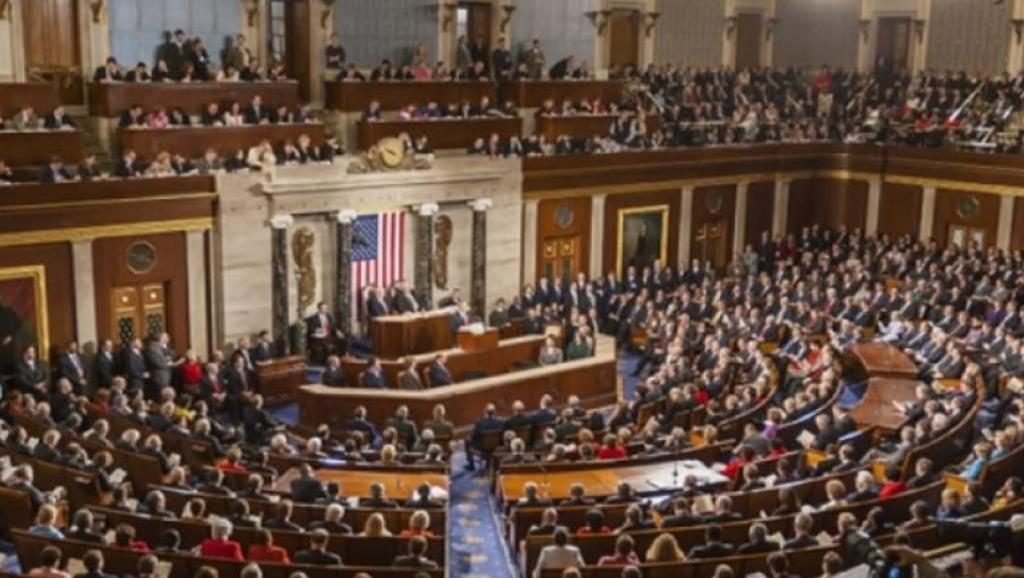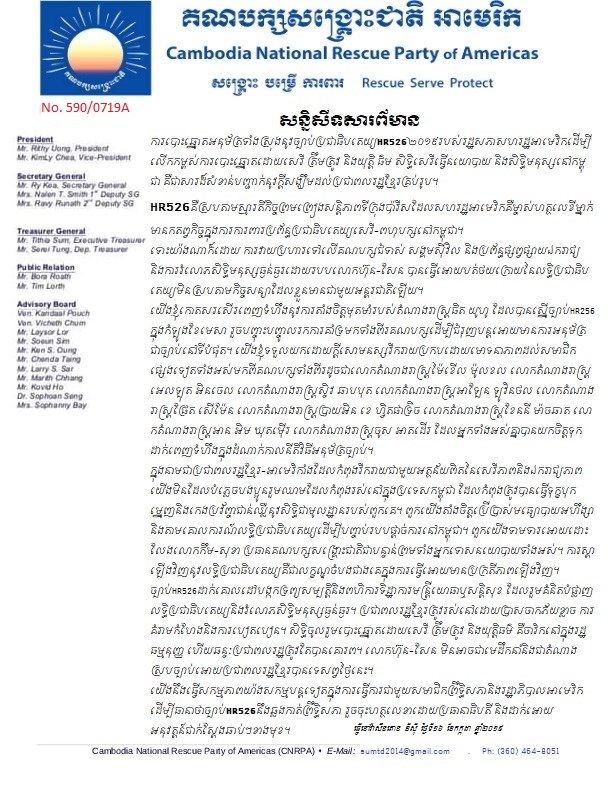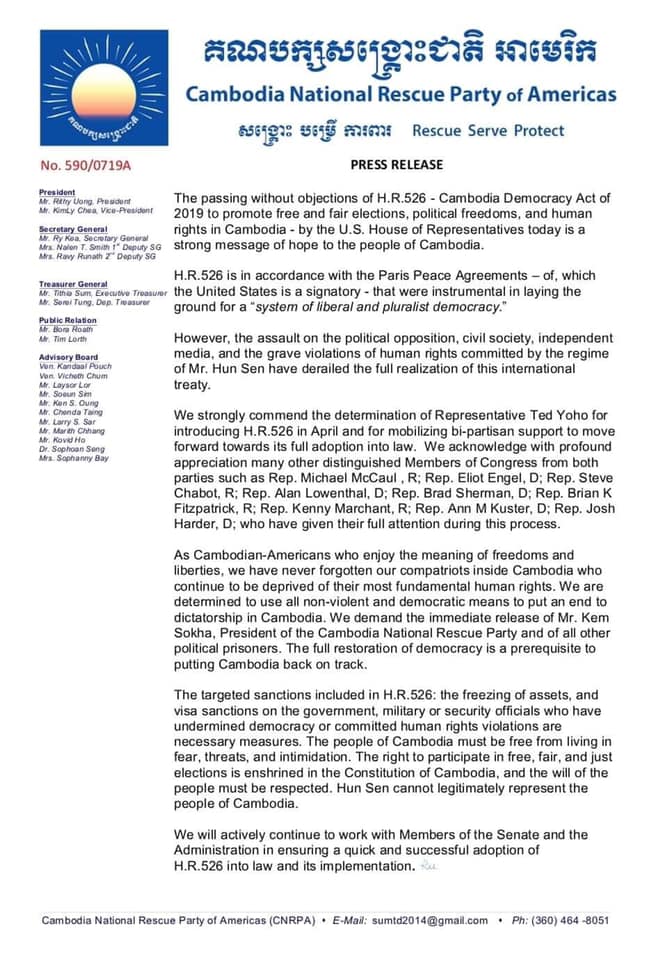H.R.526 bill was passed by the Congress and sent to the Senate immediately
Posted by: Cambodian | Posted on: July 18, 2019Shown Here:
Referred in Senate (07/16/2019)
| 116th CONGRESS 1st Session |
H. R. 526
IN THE SENATE OF THE UNITED STATESJuly 16, 2019
Received; read twice and referred to the Committee on Foreign Relations

AN ACT
To promote free and fair elections, political freedoms, and human rights in Cambodia, and for other purposes.
Be it enacted by the Senate and House of Representatives of the United States of America in Congress assembled,


SECTION 1. SHORT TITLE.
This Act may be cited as the “Cambodia Democracy Act of 2019”.
SEC. 2. FINDINGS.
Congress finds the following:
(1) Prime Minister Hun Sen has been in power in Cambodia since 1985 and is the longest-serving leader in Southeast Asia. Despite decades of international attention and assistance to promote a pluralistic, multi-party democratic system in Cambodia, the Government of Cambodia continues to be undemocratically dominated by the ruling Cambodia People’s Party (CPP), which controls every agency and security apparatus of the state.
(2) In 2015, the CPP-controlled parliament passed the “Law on Associations and Non-Governmental Organizations”, which gave the government sweeping powers to revoke the registration of NGOs that the government believed to be operating with a political bias in a blatant attempt to restrict the legitimate work of civil society. On August 23, 2017, Cambodia’s Ministry of Foreign Affairs ordered the closure of the National Democratic Institute and the expulsion of its foreign staff. On September 15, 2017, Prime Minister Hun Sen called for the withdrawal of all volunteers from the United States Peace Corps, which has operated in Cambodia since 2006 with 500 United States volunteers providing English language and healthcare training.
(3) The Government of Cambodia has taken several measures to restrict its media environment, especially through politicized tax investigations against independent media outlets that resulted in the closure of The Cambodian Daily and Radio Free Asia in early September 2017. Additionally, the Government of Cambodia has ordered several radio stations to stop the broadcasting of Radio Free Asia and Voice of America programming.
(4) On September 3, 2017, Kem Sokha, the President of the Cambodia National Rescue Party (CNRP), was arrested on politically motivated charges, including treason and conspiring to overthrow the Government of Cambodia, and faces up to 30 years in prison. The CNRP’s previous leader, Sam Rainsy, remains in exile. On November 16, 2017, Cambodia’s Supreme Court dissolved the CNRP, eliminating the primary opposition party.
(5) Each of the six elections that have taken place in Cambodia since 1991 were conducted in circumstances that were not free and fair, and were marked by fraud, intimidation, violence, and the government’s misuse of legal mechanisms to weaken opposition candidates and parties.
(6) In the most recent general election in July 2018, following the dissolution of the CNRP, the CPP secured every parliamentary seat, an electoral victory that a statement from the White House Press Secretary stated was “neither free nor fair and failed to represent the will of the Cambodian people”.
(7) The United States is committed to promoting democracy, human rights, and the rule of law in Cambodia. The United States continues to urge the Government of Cambodia to immediately release Mr. Kem Sokha, reinstate the political status of the CNRP and restore its elected seats in the National Assembly, and support electoral reform efforts in Cambodia with free and fair elections monitored by international observers.
SEC. 3. SANCTIONS RELATING TO UNDERMINING DEMOCRACY IN CAMBODIA.
(a) Designation Of Persons Responsible For Undermining Democracy In Cambodia.—
(1) IN GENERAL.—Not later than 180 days after the date of the enactment of this Act, the President shall designate and transmit to the appropriate congressional committees a list of—
(A) each senior official of the government, military, or security forces of Cambodia who the President determines has directly and substantially undermined democracy in Cambodia;
(B) each senior official of the government, military, or security forces of Cambodia who the President determines has committed or directed serious human rights violations associated with undermining democracy in Cambodia; and
(C) entities owned or controlled by senior officials of the government, military, or security forces of Cambodia described in subparagraphs (A) and (B).
(2) IMPOSITION OF SANCTIONS.—The President shall impose the sanctions described in subsection (b) on each foreign person designated pursuant to paragraph (1).
(3) UPDATES.—The President shall transmit to the appropriate congressional committees updated lists under paragraph (1) as new information becomes available.
(b) Sanctions Described.—The sanctions described in this subsection are the following:
(1) ASSET BLOCKING.—The President shall exercise all of the powers granted to the President under the International Emergency Economic Powers Act (50 U.S.C. 1701 et seq.) to the extent necessary to block and prohibit all transactions in property and interests in property of a foreign person designated under subsection (a) if such property and interests in property are in the United States, come within the United States, or are or come within the possession or control of a United States person.
(2) INADMISSIBILITY OF CERTAIN INDIVIDUALS.—
(A) INELIGIBILITY FOR VISAS AND ADMISSION TO THE UNITED STATES.—A foreign person designated under subsection (a) is—
(i) inadmissible to the United States;
(ii) ineligible to receive a visa or other documentation to enter the United States; and
(iii) otherwise ineligible to be admitted or paroled into the United States or to receive any other benefit under the Immigration and Nationality Act (8 U.S.C. 1101 et seq.).
(B) CURRENT VISAS REVOKED.—A foreign person designated under subsection (a) is subject to the following:
(i) Revocation of any visa or other entry documentation regardless of when the visa or other entry documentation is or was issued.
(ii) A revocation under clause (i) shall—
(I) take effect immediately; and
(II) automatically cancel any other valid visa or entry documentation that is in the foreign person’s possession.
(C) EXCEPTION TO COMPLY WITH INTERNATIONAL OBLIGATIONS.—Sanctions under this paragraph shall not apply with respect to a foreign person if admitting or paroling the person into the United States is necessary to permit the United States to comply with the Agreement regarding the Headquarters of the United Nations, signed at Lake Success June 26, 1947, and entered into force November 21, 1947, between the United Nations and the United States, or other applicable international obligations.
(3) PENALTIES.—The penalties provided for in subsections (b) and (c) of section 206 of the International Emergency Economic Powers Act (50 U.S.C. 1705) shall apply to a foreign person that violates, attempts to violate, conspires to violate, or causes a violation of paragraph (1) to the same extent that such penalties apply to a person that commits an unlawful act described in subsection (a) of such section 206.
(c) Implementation.—The President may exercise all authorities provided under sections 203 and 205 of the International Emergency Economic Powers Act (50 U.S.C. 1702 and 1704) to carry out this section.
(d) Waiver.—The President may waive the application of sanctions described in subsection (b) with respect to a person designated under subsection (a) if the President determines and certifies to the appropriate congressional committees that such waiver is in the national interest of the United States.
(e) Exception Relating To Importation Of Goods.—
(1) IN GENERAL.—The authorities and requirements to impose sanctions authorized under this Act shall not include the authority or requirement to impose sanctions on the importation of goods.
(2) GOOD DEFINED.—In this subsection, the term “good” means any article, natural or man-made substance, material, supply or manufactured product, including inspection and test equipment, and excluding technical data.
SEC. 4. SUSPENSION OF SANCTIONS.
(a) Suspension.—The sanctions described in section 3 may be suspended for up to 1-year upon certification by the President to the appropriate congressional committees that Cambodia is making meaningful progress toward the following:
(1) Ending government efforts to undermine democracy.
(2) Ending human rights violations associated with undermining democracy.
(3) Conducting free and fair elections which allow for the active participation of credible opposition candidates.
(b) Renewal Of Suspension.—The suspension described in subsection (a) may be renewed for additional, consecutive-day periods if the President certifies to the appropriate congressional committees that Cambodia is continuing to make meaningful progress towards satisfying the conditions described in such subsection during the previous year.
SEC. 5. DETERMINATION OF BUDGETARY EFFECTS.
The budgetary effects of this Act, for the purpose of complying with the Statutory Pay-As-You-Go Act of 2010, shall be determined by reference to the latest statement titled “Budgetary Effects of PAYGO Legislation” for this Act, submitted for printing in the Congressional Record by the Chairman of the House Budget Committee, provided that such statement has been submitted prior to the vote on passage.
SEC. 6. SUNSET.
This Act shall terminate on the date that is 5 years after the date of the enactment of this Act.
SEC. 7. DEFINITIONS.
In this Act:
(1) APPROPRIATE CONGRESSIONAL COMMITTEES.—The term “appropriate congressional committees” means the Committee on Foreign Affairs and the Committee on Financial Services of the House of Representatives, and the Committee on Foreign Relations and the Committee on Banking, Housing, and Urban Affairs of the Senate.
(2) PERSON.—
(A) IN GENERAL.—The term “person” means—
(i) a natural person; or
(ii) a corporation, business association, partnership, society, trust, financial institution, insurer, underwriter, guarantor, and any other business organization, any other nongovernmental entity, organization, or group, and any governmental entity operating as a business enterprise or any successor to any entity described in this clause.
(B) APPLICATION TO GOVERNMENTAL ENTITIES.—The term “person” does not include a government or governmental entity that is not operating as a business enterprise.
(3) UNITED STATES PERSON.—The term “United States person” means—
(A) a United States citizen or an alien lawfully admitted for permanent residence to the United States; or
(B) an entity organized under the laws of the United States or of any jurisdiction of the United States, including a foreign branch of such an entity.
Passed the House of Representatives July 15, 2019.












Comments are Closed